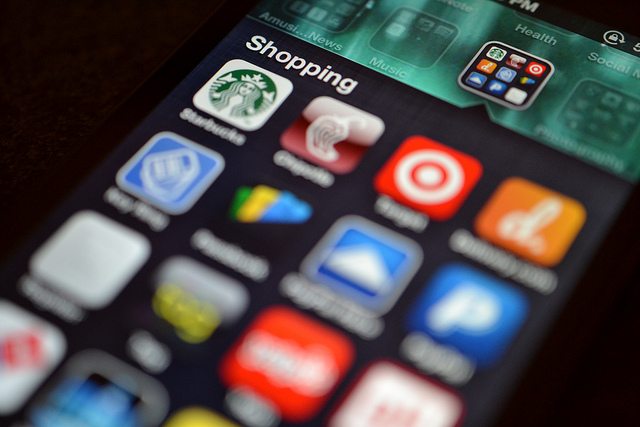The off-the-shelf software has many draws. Solutions come ready to go, meaning implementation is (typically) quick, and at least initially, such solutions are cost-effective. For retailers seeking mobile solutions, these benefits make off-the-shelf apps attractive.
However, from a long-term strategy perspective, the build vs. buy debate isn’t cut and dry. Canned solutions may end up costing more as businesses seek scalable solutions when their mobile strategies begin to ramp up. Furthermore, being adaptive in a fast-moving, competitive mobile space is much more difficult when the solution being used isn’t easy to modify.
When assessing custom retail app development vs. off-the-shelf solutions, these considerations should carry some weight in the process. While both options carry merit and disadvantages, retailers may find that off-the-shelf apps may not be the best route based on their needs and objectives.
Jason Howie – Shopping With iPhone – via Flickr
Providing a Different Brand Experience
In a previous post, we discussed the importance of mobile personalization in retail. In a space where the customer experience is so crucially important and shoppers increasingly demanding a more personalized, relevant experience, off-the-shelf solutions are at a clear disadvantage to custom applications.
Even with white labeled options, there are only so many ways you can modify the solution and differentiate your brand experience from others. UI is particularly important in this regard. You want to provide your customers with a consistent and seamless user experience across every touchpoint – in-store, online, and mobile. Canned solutions are rigid, not allowing you to create a custom branded experience on mobile that is consistent with your other properties.
Customization
Many off-the-shelf solutions are very powerful, ticking a lot of the boxes retailers seek in a mobile solution. However, there is no packaged solution out there that does everything you need it to. Off-the-shelf apps are meant to meet many needs for many companies, but they don’t address the intricacies and nuances unique to each organization. This can be a massive disadvantage to retailers, especially since other retailers are already investing in custom solutions (Walgreens, Macy’s, Walmart, Target, among countless others).
Custom retail apps have the advantage of being designed to fit your exact business needs. It’s likely that you’ll require deep integrations with legacy systems and services, have unique requirements that off-the-shelf solutions can’t address, and need the flexibility to adapt and change as goals shift or new requirements arise.
Since custom development allows you to own the code and retain ownership of the solution, changes can be made quickly and as needed – a benefit that isn’t readily available with the off-the-shelf software. This allows your organization to adapt quickly to changing market needs, which can be the difference between success and obsolescence.
Compatibility
Retailers – especially medium to large ones – will already have a number of legacy systems in place that are designed to handle different business and operational functions. Finding an off-the-shelf solution that is easily compatible with these systems is near impossible. To integrate these types of solutions often means undergoing processual changes internally and modifying other systems being used.
With custom builds, on the other hand, you can integrate a wider set of APIs to ensure that your mobile solution and other legacy systems communicate and work with one another effectively. Furthermore, you can work to proactively identify what the custom app needs to integrate with and build it to accommodate these needs, rather than working backwards from a packaged solution.
Off-The-Shelf or Custom?
Ultimately, the decision between off-the-shelf software or a custom retail app will depend on what your business goals are and the purpose of your mobile strategy. Some retailers may find that off-the-shelf solutions can meet their short-term needs, especially if custom technology won’t offer a significant competitive advantage. Conversely, retailers who are looking for a scalable solution may find that the customization, flexibility, and branding potential of a custom retail app better aligns with their long-term organizational goals.





